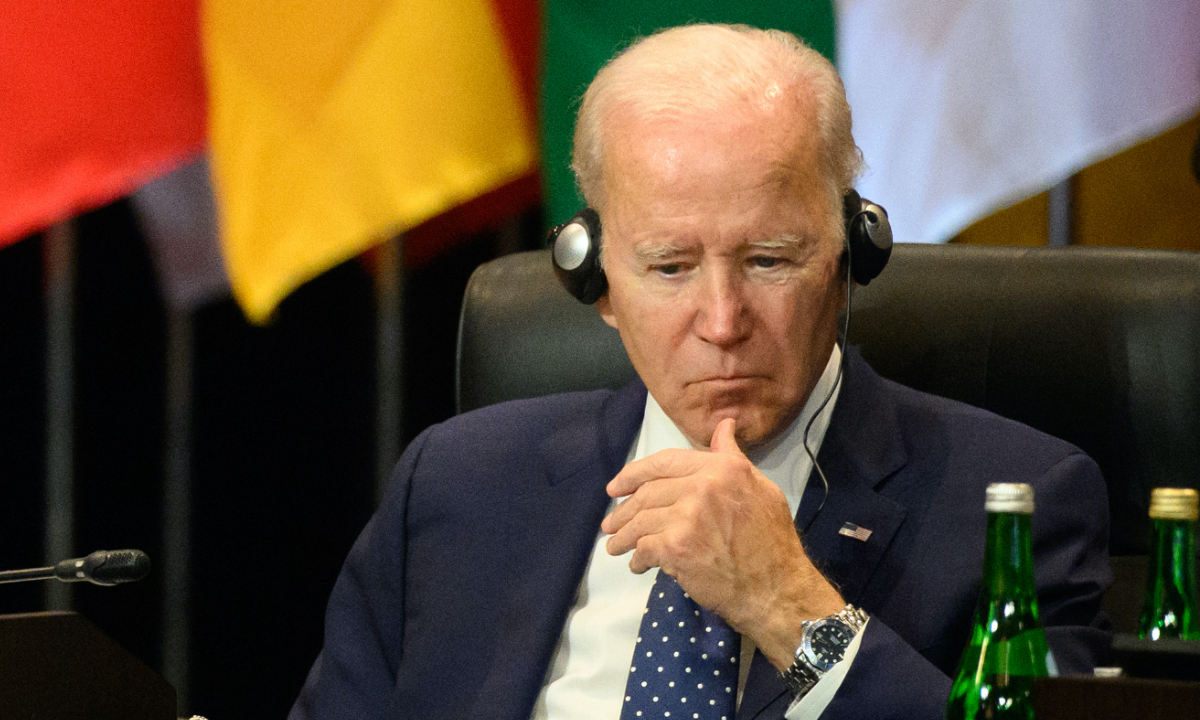
The town of Hasselfelde, Germany is covered with snow on December 2, 2022. Photo: VCG
Having been drawn into the protracted and intense Russia-Ukraine conflicts, experiencing inflation and skyrocketing energy costs... Nine months after the outbreak of the conflict between Russia and Ukraine in February, more people in the EU - from politicians to business leaders - have realized how they have been caught in the US' trap, as the latter uses the EU crisis as an opportunity to enrich itself at the expense of the EU.
Top European officials are furious with Joe Biden's administration and have accused the US of making the most profit from the Ukraine crisis from selling gas at high prices and offloading more weaponry, Politico reported, noting that such explosive comments were backed in public and private by officials, diplomats, and ministers elsewhere.
Veteran US diplomat Henry Kissingeronce quipped that "it may be dangerous to be America's enemy, but to be America's friend is fatal." Analysts said that many people in the EU may frequently think of this statement because the EU has suffered the most as the US tries to maintain its hegemony and bullies others, including its allies, through unilateral policies.
A colder winter
How to get through this winter has become a question for not only European residents but also politicians as Russia greatly cut its gas supplies to EU states in response to the latter's sanctions, leading to the prices of gas in Europe to soar.
"The weather is getting colder and colder, but we can't afford to keep warm. Many people were forced to turn off air conditioning and heating, and even some people have frozen to death," said Hayley, a programmer working in France, when asked about the biggest problems in daily life.
She told the Global Times that her company struggled through the COVID-19 global pandemic, and now they are forced to face a new crisis, and "it feels very pathetic."
Haley is not the only one who's worried. A housewife from Poland who spoke to the Global Times on condition of anonymity said that her husband's factory has cut working hours to reduce energy consumption and his salary has also been affected.
"The energy prices have gone up, making it harder to average working family to live," the housewife said, noting that to last through this hard winter, she and some friends brought some electric blankets from China's Yiwu.
Turning down the air conditioners, stocking up on wood, buying electric blankets, or other heating gears from China's Yiwu, putting on turtleneck sweaters… residents in European countries are trying hard to keep warm in the winter. While many European countries are racking their brains to try and curb the impact of rising energy prices on households and businesses, for instance, giving energy allowance or cost-of-living bonuses to workers, the discontent from the public is growing as protests broke out in cities in France, Germany, and other EU states.
Compared to its bitterness, the EU's ally - the US, has made a great fortune from the Ukraine crisis with the EU paying most of the price, analysts said. As Russia's liquefied natural gas (LNG) supplies plummet, Europe is buying more gas from the US despite higher prices, delivering unprecedented profits to US gas suppliers, with each LNG carrier to Europe making an average of more than $200 million in profit, according to media reports.
According to data from industrial websites, there has been big differences on price of natural gas between the European and American markets, which has allowed US suppliers to reap unprecedented profits and stimulate business interests in investing in LNG. For example, in continental Europe, the front-month Title Transfer Facility (TTF) gas price closed at around $39 per million British thermal units (MMBtu) on November 23 while in the US, the Henry Hub front-month gas spot price was over $7/MMBtu on the same day.
By searching for data from the US Energy Information Administration, the Global Times found that the oil and natural gas the US shipped to the EU continued to increase supply this year. Reuters also reported in September that in that month, a total of 87 pieces of cargo departed from US ports, carrying 6.3 million tons (mt) of LNG and almost 70 percent of the cargo, or 4.37 mt, headed for Europe.

US President Joe Biden attends a working session on food and energy security during the G20 Summit in Bali, Indonesia on November 15, 2022. Photo: VCG
Data shows that by exporting energy, the US greatly decreased the risk of economic recession in the third quarter and the EU made sacrifice to help the US' economic rebound, analysts said.
The US' selling of high-price energy to the EU has incurred increasing dissatisfaction. For example, in October, at a press conference in Brussels following a meeting with other EU leaders, French President Emmanuel Macron slammed the US for creating "a double standard" by selling natural gas to Europe "at record prices."
In responding to criticism from Europe, the US is shifting blames to Russia. And in a report from the Financial Times in November, Brad Crabtree, an assistant secretary in the US department of energy, was cited as saying that it was European off-takers that were benefiting from the arbitrage between US and European prices, not US producers.
As Europe grapples with how to reduce its energy dependency on Russia, Europe may pay a heavier price on its global competitiveness, observers said, noting that high prices have already led to shutdowns in energy-hungry industries and if the energy crisis continues, Europe's energy deficit will widen, requiring even bigger cuts in consumption. Major economies may also suffer a GDP drop.
Another strike in a row
While Europe is not satisfied with the US' selling of high-priced energy, it has received another strike from the latter - the Inflation Reduction Act, which was approved by US lawmakers in August and includes a record $369 billion in spending on climate and energy policies.
Such a package is comprised of tax credits for electric cars made in North America and supports the US battery supply chain which has raised concerns in the EU.
Such protectionism is genuinely reshaping the economic climate in the EU to benefit the US rather than Europe, and it will affect the migration of industries and investment from the EU to the US, Cui Hongjian, director of the Department of European Studies at the China Institute of International Studies, told theGlobal Times.
Unlike the EU, which will confront growing energy prices for a long time, the US has steadier and cheaper energy, making it more appealing to European enterprises. Furthermore, while both the US and the EU are raising interest rates to combat inflation, the EU has less room to continue the practice as compared to the US. If the euro's exchange rate falls, companies' export costs will rise, causing more European firms to relocate to the US, said Cui.

A man cuts and stores wood to heat up his home in the winter as their neighborhood still lacks gas utilities in Izyum, Ukraine on October 30, 2022. Photo: VCG
The Financial Times also said in a report in November that the energy crisis gives the US a chance to "woo big European companies."
The US is using such an act to entice industrial businesses to return to the US, potentially hollowing out the EU. Cui said that, given its present economic and energy policies, the US has changed the essential concept of being an ally to the EU and views Europe as a market where it can gain more interests in both politics and economics. And without properly solving the disputes, the US-EU alliance will face a new blow.
The US' selfishness has been fully exposed as Europe has felt the inequality on bilateral relations. By representing France and the EU, French President Marcon also hoped to negotiate with the US during his recent visit to the US but unfortunately, there is little possibility for the US to adjust its policies, said experts.
Amid the Russia-Ukraine conflict, the US has made a great fortune by supplying energy to the EU, realizing its goal of containing Russia and increasing US influence in the EU and the US subsidies may further undermine Europe's competitiveness, observers said, warning that there will be more turmoil in the EU if the Ukraine crisis continues with the public's dissatisfaction toward local governments growing and disputes among European countries intensifying.
As rational voice in the EU is growing to call for the bloc to maintain strategic independence and promote policies for its own interests, for example to keep bilateral relations with China, analysts also noted that governments in related countries should take concrete steps to protect their own people and national interests rather than only serving the US' geopolitical interests.



